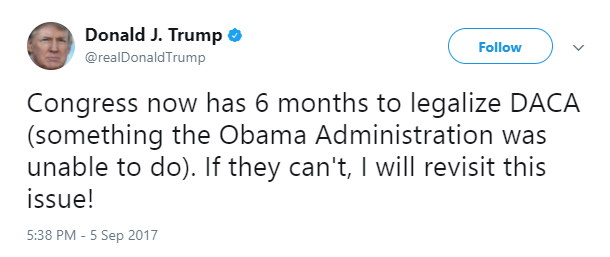Repeal of DACA creates problems, stress for childhood immigrants
President Donald Trump tweeted that Congress has six months to find a solution to the repeal of DACA
October 2, 2017
In early September, President Donald Trump announced the repealing of the Deferred Action for Childhood Arrivals, a program that protects people that were brought to the United States illegally as children.
While he later clarified that he will work with Congress over the next six months to come up with a solution, there is still concern that the full repeal will stand.
“Most of these students came here when they were babies, they don’t even know their country there,” said Teresa Wright, ESOL Parent Outreach team member. “Many of them are more fluent in English than they are in their own language.”
According to uscis.gov, applicants have to have arrived before turning 16 and lived in the US prior to June 15, 2007 to be eligible for DACA. Applicants also could not be over the age of 30 when the program was enacted in 2012.
Due to this program, “recipients have been able to come out of the shadows and obtain valid driver’s licenses, enroll in college and legally secure jobs,” CNN said. As well as receiving the benefits, recipients must also pay income taxes.
“[DACA recipients] are very useful citizens, they are paying taxes and they are doing their best. So when I heard the decision to stop the program I [was] very sad because there are 800,000 kids like them,” Wright said. “Also this program is not a cheap program.”
Recipients of the DACA program must pay an additional $485 every two years for their renewal beside the initial fees.
“It’s definitely going to affect students and their families who now have an added layer of stress in their lives,” English teacher Sonya Shpilyuk said. “Obviously the effect is not going to be the same for everyone.”
DACA program gave students the opportunity to work and study legally in the United States, allowing them to build futures for themselves.
This decision could affect students who are planning on going to college by raising their college tuition by a factor of three. “[Students] who filled all those criteria and were hoping to be able to go to college on a DACA scholarship … may have lost hope,” ESOL Resource teacher Margaret Vanbuskirk said.
Wright and others have been working with lawyers to help students renew the program. “Last week at Gaithersburg High School … [the lawyers] were helping [students] to renew the DACA without charging them,” Wright added.
This decisions may deter students from actively participating in their communities and at school. “I was really disappointed because it seemed like it’s another … indicator of less support for students who are living in the United States and trying to build a future here,” Vanbuskirk added. “[Especially those] who may have come here through no fault of their own or responsibility of their own.”
Despite the uncertainty of the program, students are being told to “do their best, to renew the DACA … and continue doing their best,” Wright said.








